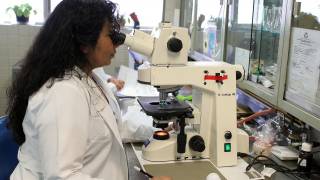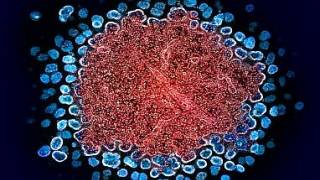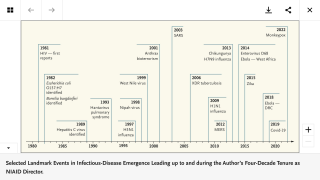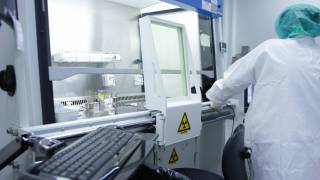HIV Vaccine Research Receives $129 Million Boost

An international collaboration has received a $129 million award from the National Institutes of Health (NIH) to advance next-generation Human Immunodeficiency Virus (HIV) vaccines.
This is important news since there is not an effective cure available today for HIV.
This 7-year award from NIH’s National Institute of Allergy and Infectious Diseases (NIAID) will support refinement and manufacture of novel HIV vaccine candidates so that they can move into early-stage, human clinical testing.
There are no preventive vaccines for HIV, but there are HIV prevention medicines, such as pre-exposure prophylaxis (PrEP) and post-exposure prophylaxis (PEP).
HIV candidate vaccine products are designed to be administered in multiple stages to induce immune system proteins called broadly neutralizing antibodies (bnAbs). In multiple animal studies, bnAbs have been shown to provide long-lasting protection against exposure to multiple HIV strains.
The award will fund the Scripps Consortium for HIV/AIDS Vaccine Development (CHAVD), comprised of 26 investigators: eight principal investigators at Scripps Research and 18 principal investigators at 13 other CHAVD-affiliated scientific organizations, including projects at four foreign sites.
“Previous NIH support for this international collaboration allowed us to lay the scientific foundation for developing an unprecedented and highly promising approach to HIV vaccination,” said Dennis Burton, Ph.D., director of the Scripps CHAVD and co-chair of the Department of Immunology and Microbiology at Scripps Research.
“This new award provides critical funding to refine this approach and bring it into human clinical testing.”
The goal of developing an HIV vaccine has proven extremely difficult to achieve. The virus presents a daunting challenge, as its slippery surface provides few targets for the immune system and its ability to rapidly evolve allows it to outpace the immune response and current vaccination efforts.
HIV vaccine news
- HIV Preventive Vaccine Launches Large Phase 2b Efficacy Study
- Therapeutic Vaccines Improve the Body’s Immune Response to HIV
- Slow-Dosing HIV Vaccination Strategy Worked Best
Many different strains of HIV circulate among people living with the virus at any given time; just one person may carry hundreds of thousands of variants of the virus.
Dr. Burton and his colleagues opened a new front in HIV vaccine design in 2009 when they discovered 2 potent antibodies in the blood cells of a woman living with HIV that were capable of neutralizing 70 percent of 162 HIV reference strains representative of the global epidemic.
This innovation raised the possibility of engineering vaccines that could induce a person’s immune system to generate such bnAbs, thus providing broad protection against multiple HIV strains.
To pursue this and other novel concepts in HIV vaccine research, the Scripps Center for HIV/AIDS Vaccine Immunology and Immunogen Discovery was formed in 2012 with a $77 million grant from the NIAID.
A major focus of research under the new award will be refining the immunogens, developing scalable manufacturing methods, and providing the immunogens for testing the sequential vaccine regimen in early-stage human clinical trials.
In partnership with the International AIDS Vaccine Initiative (IAVI), the researchers will launch the first human study of a sequential vaccine in Phase I clinical trial (IAVI W001) to test a novel HIV vaccine candidate, BG505 SOSIP.664 gp140 during 2019.
In addition to Dr. Burton, seven other Scripps Research professors will serve as principal investigators on the grant: Bryan Briney, Ph.D., Lars Hangartner, Ph.D., James Paulson, Ph.D., William Schief, Ph.D., Andrew Ward, Ph.D., Ian Wilson, DPhil, and Richard Wyatt, Ph.D.
Scientific leaders from the 13 affiliated institutions include Rafi Ahmed, PhD, of Emory University; Facundo Batista, PhD, of the Ragon Institute; Max Crispin, DPhil, of the University of Southampton; Shane Crotty, PhD, of the La Jolla Institute for Allergy and Immunology; Peter Gilbert, PhD, Raphael Gottardo, PhD, Juliana McElrath, MD, PhD, and Leonidas Stamatatos, PhD, of the Fred Hutchinson Cancer Research Center; Thomas Hassell, PhD, of the International AIDS Vaccine Initiative; Darrell Irvine, PhD, of the Howard Hughes Medical Institute and Massachusetts Institute of Technology; Gunilla B. Karlsson Hedestam, PhD, of the Karolinska Institute; Daniel E. Kaufmann, MD, of the University of Montreal; Penelope Moore, MD, PhD, of the University of the Witwatersrand and South Africa’s National Institute for Communicable Diseases; Bali Pulendran, PhD, of Emory University and Stanford University; Michel Nussenzweig, MD, PhD, of The Rockefeller University; Devin Sok, PhD, an IAVI collaborator at Scripps Research; Guido Silvestri, MD, of Emory University; and Bruce D. Walker, MD, of the Howard Hughes Medical Institute and the Ragon Institute.
Our Trust Standards: Medical Advisory Committee
























